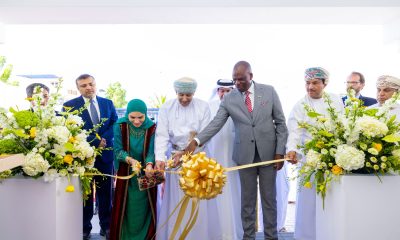GCC
Energising the Energy Sector – The Abdullah Bin Hamad Al-Attiyah Foundation

In Qatar we always support greater cooperation between producing and consuming countries and I believe that the traditional confrontation between them should be left in the past. We should not waste time blaming each other and should seek solutions to ensure security of supply, stability of prices and the curtailment of greenhouse gas emissions.
OPEC’s obituary was written many times when facing difficult times over its 50 years. Is this current period any different?
I went to my first OPEC meeting in 1972, shortly after joining the oil ministry. It was an interesting experience sitting in the back seat learning from the people who were creating oil policies. Since then I have attended OPEC conferences regularly for 40 years.
The challenge for OPEC then was how to confront the International Oil Company (IOC), which controlled the industry and benefited from keeping prices low because it owned the concessions and the refineries. The main focus was how to create a lobby to put pressure on the IOCs to increase prices and how to set up National Oil Companies.
In 1973 an oil shock followed the embargo by OPEC and Arab producers in response to US support for Israel in the Yom Kippur war. Prices began rising from two to three dollars to over 36 dollars in 1981. That was a turning point for producers who started to control their own assets and the IOCs started to lose control. By 1975 producers started setting up their national oil companies, but could not get rid of the IOC totally because they needed their technical help. It was a marriage of convenience.
Producers thought the high oil prices would go on forever, so they were shocked when by 1985 the prices started to crash and never exceeded 17 dollars a barrel until 2000.
OPEC started to talk for the first time about cutting supply and I found that there was no trust amongst the members. They would commit to cutting supply, but some never did. We met many times and meetings started getting longer, from three days to more than three weeks.
One OPEC conference in Geneva lasted one month! We had one meeting and the rest was all bilateral talks on how to convince members to respect production quotas and how much to cut from each country. That made the market nervous and prices went down more. We had to break a meeting for one week over Christmas because Swiss security told us they would be too busy to provide us with full security.
In the 1990s, non-OPEC producers were beginning to have a bigger market share, so we started talking to them to persuade them to cooperate. I was elected OPEC president several times, and visited some of those countries. I told them that they had to support OPEC, but they never did. In fact, when we cut production to try and control prices, they increased production. OPEC was always open to them, always wanted to work with them.
*Courtesy: Gulf Intelligence

-

 Banking & Finance2 weeks ago
Banking & Finance2 weeks agoOman Oil Marketing Company Concludes Its Annual Health, Safety, Environment, and Quality Week, Reaffirming People and Safety as a Top Priority
-

 Economy2 months ago
Economy2 months agoMaal Card: What Oman’s New National Payment Card Means for Everyday Users
-

 News2 months ago
News2 months agoSheikh Suhail Bahwan, Chairman of Suhail Bahwan Group, Passes Away
-

 News1 month ago
News1 month agoOIG Appoints New CEO to Lead Its Next Chapter of Excellence
-

 Economy2 months ago
Economy2 months agoOman Unveils Official Omani Rial Symbol in Landmark Move to Boost Global Currency Presence
-

 News1 month ago
News1 month agoReport: How India & The Middle East Are Exploiting Immense Economic Synergies
-

 Uncategorized1 month ago
Uncategorized1 month agoOman’s ISWK Cambridge Learners Achieve ‘Top in the World’ and National Honours in June 2025 Cambridge Series
-

 Trade1 month ago
Trade1 month agoConsulate Office of the Republic of South Africa opens in Muscat, enhancing bilateral relations




























You must be logged in to post a comment Login